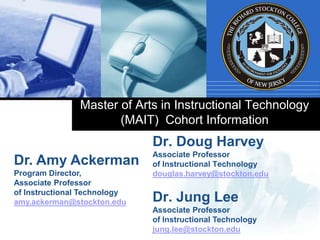
MAITcohortinfoMarch2013
- 1. Master of Arts in Instructional Technology (MAIT) Cohort Information Dr. Doug Harvey Associate Professor Dr. Amy Ackerman of Instructional Technology Program Director, douglas.harvey@stockton.edu Associate Professor of Instructional Technology amy.ackerman@stockton.edu Dr. Jung Lee Associate Professor of Instructional Technology jung.lee@stockton.edu
- 2. Topics What is the MAIT program? Supervisory Certificate Program What is the MAIT cohort program? Application Process Q&A
- 3. MAIT Program deals with The improvement of teaching, learning and performance through the application of learning theory and technology.
- 4. MAIT program focuses on Designing instruction from the perspective of the learner rather than from the perspective of the content (the traditional education and training approach).
- 5. MAIT Program serves Educators, administrators, and related personnel in P-12 schools and higher education, as well as those involved in instructional design, development, and training in government and corporate sectors.
- 6. MAIT Curriculum 11 courses (33 credits) 6 Core courses including Research & Capstone courses 5 Elective courses For example: Integrating Technology in the Classroom Web Design and Development Distance Learning in Education Digital Video Production Grant Writing
- 7. After the MAIT degree: Supervisory Cert Courses To apply for the Supervisory Certificate, Required Courses (Prerequisite: Master’s Degree) EDUC 6110: Curriculum Development & Evaluation EDUC 6120: Principles of Supervision Optional Electives (2 courses) INTC 5160: Instructional Design INTC 5230: Supervising & Coordination Ed Tech INTC 5330: Integrating Technology in the Classroom More courses available in the MAED program
- 8. What is the MAIT Cohort Program? All classes are offered at a school site or via distance education. All courses include hybrid (face-to-face and online) component with some offering total, virtual attendance. The same group of students (cohort) proceeds through the program together. The curriculum is customized to the specific needs of the cohort group.
- 9. Benefits of MAIT Cohort Faculty/staff convenience Networking synergy among colleagues Customized Professional Development Better prepared faculty/staff, new and experienced Highly qualified teachers to meet NJCCS 8.1 standards Content & Technology integration Pedagogy Course/training design and assessment Use of local community facilities Mobilization of local human resources
- 10. Cohort Curriculum Same rigor as the on-campus courses Total 11 courses (33 credits) 6 core courses Instructional Technology in 21st Century Learning, Visual Communications, Learning Strategies in I.T, Instructional Design, Research, Capstone 5 elective courses Selected and customized by the cohort group Possible to provide a new course based on needs of the cohort group
- 11. Duration Determined by the cohort group Three courses per year Fall, Spring, and Late Spring 3.5 years OR Two courses per year Fall and Spring 5.5 years
- 12. Class Time Adjusted to teachers’ schedules (district academic calendar) rather than following Stockton schedule Right after the end of the school day 3.5 hours, once a week, 11-12 weeks Three courses during a school year
- 13. Instructors for Cohort Program Core courses: MAIT faculty members Electives: MAIT faculty or highly qualified adjuncts, including MAIT alumni
- 14. For a new MAIT Cohort If the cohort agrees, MAIT will offer EDUC 6110: Curriculum Development & Evaluation as an elective course, so that, after receiving a MAIT degree, you need to take only one more course to complete required NJ Supervisory Certificate courses.
- 15. Application Process You can start as a non-matriculated student Up to 6 credits (However, we recommend that you apply for the MAIT program at Stockton before taking a course) Why do I need to be matriculated? Need to pay non-matriculated student fee each term ($50) Cannot apply for financial aid Cannot apply for Graduate Assistantship Do not receive student ID
- 16. Application process (cont’d) Check the Stockton Graduate Program website. Go to http://www.stockton.edu/grad (Academics/ Graduate Programs/ Prospective Students/ How to Apply) On-line application available Fill in the application form and essay Three letters of recommendation All transcripts
- 17. Application process (cont’d) No testing if currently hold a Master’s degree GRE or Miller Analogies Test Stockton has a computer-based testing center Make an appointment (609-652-4227 – Grad Studies) Testing days at Stockton http://intraweb.stockton.edu/eyos/page.cfm?siteID=107&pageID=262 Immunization requirements State mandatory
- 18. New Tuition Rate for MAIT Off-campus Programs Stockton cohort pricing All inclusive tuition price: $600 per credit (No additional fees) 13 or more students in the group: $570 per credit (No additional fees)
- 19. Payment Options: Option 1: Pay full amount on the 1st day of class Option 2: Deferred Payment ($50.00 charge) 1. 1/3 of all inclusive tuition rate + $50 due by 1st day of class 2. 1/3 due 30 business days prior to the END of class 3. 1/3 due 30 days AFTER the end of class.
- 20. What is the next step? Complete non-matriculation form http://stockton.edu/grad • Submit reimbursement request for school district, if applicable If questions, email MAIT Program Director amy.ackerman@stockton.edu
- 21. Any Questions? Q&A Thank you for your interest in the MAIT program Stockton! http://www.facebook.com/StocktonMAIT